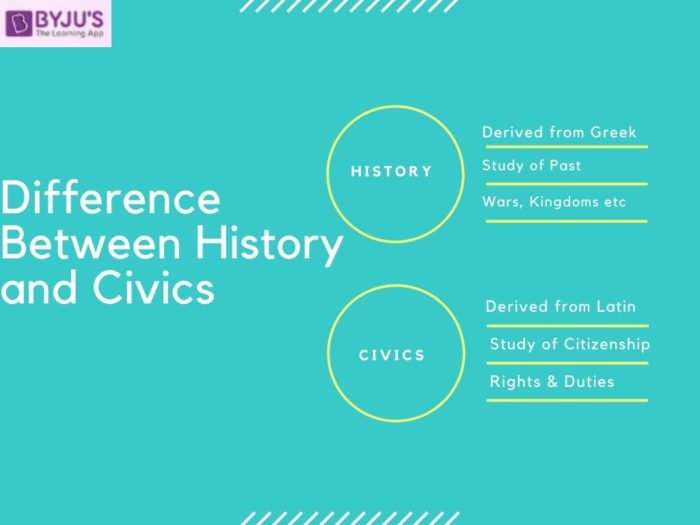Difference between History and Civics is explained here in detail. Civic education is the study of the theoretical, political and practical aspects of citizenship. History is an umbrella term that relates to past events as well as the memory, discovery, collection, organization, presentation, and interpretation of information about these events. The difference between History vs Civics given here can help the UPSC Civil Service exam aspirants to understand the basics better and know their comparisons thoroughly.

The major difference between History and Civics are:
| History | Civics |
| History is derived from Greek word historia, meaning ‘inquiry. It refers to the knowledge acquired by investigation’ | Civics derives from the Latin word civicus, meaning “relating to a citizen”, |
| History deals with the study of past events, analysing the past memories documented by historians. Study of History began once writing was invented and all the important events began to be documented. People who study history are called historians. History studies about past kings, wars, the expansion of kingdoms etc. The classification of history as per time period are modern history, medieval history and ancient history. | Civic education is the study of citizenship. It includes the practical, political and theoretical, aspects of citizenship. |
| There are many classifications in the study of history, it is history based on geographical regions, social history, history of religion, military history, cultural history, economic history, economic history. | Civics also involves the study of rights and duties of citizens; it includes the study of civil code and civil law. |
These are the main differences between History and Civics.The differences given in the above table can help the UPSC Civil Service Exam aspirants to answer any related questions easily in the exams.
After learning about the History and Civics difference, diligently refer to the NCERT Notes on History of Ancient India, Medieval India and Modern India. In addition refer to the Indian Polity Notes. It is better to know the syllabus, book list and strategies that can be implemented for the Public Administration and Political Science Optionals for UPSC Exam. Visit the below-given links to learn about the Strategy for Political Science and Public Administration Optional subjects, also refer to the important Notes on Ancient, Medieval, and Modern India in detail along with other information.
- NCERT Notes – History of Ancient India
- NCERT Notes – History of Medieval India
- NCERT Notes – History of Modern India
- Indian Polity Notes – For UPSC Civil Service Exam
- Strategy for Political Science and International Relations Optional – Syllabus, Book List, Toppers
- Strategy for Public Administration Optional for UPSC Civil Service Exam – Syllabus, Books.
- Difference between History and Prehistory
- Difference between History and Archaeology
- Difference between History and Mythology
- Comprehensive List of Difference between Articles – Economics, Polity, History & more
Difference between History and Civics – UPSC Notes:- Download PDF Here
Frequently Asked Questions about History and Civics
Who is known as the father of civics?
What is the importance of studying civics?
The above details would help candidates prepare for UPSC 2023.
Related Links
| IAS Salary | Static GK |
| Indian Geography Book | UPSC Paper |
| Separation of Powers in India | First War of Independence 1857 |
| Wildlife Protection Act 1972 pdf | Lahore Session |

Comments